2016 - 2017 Cohort
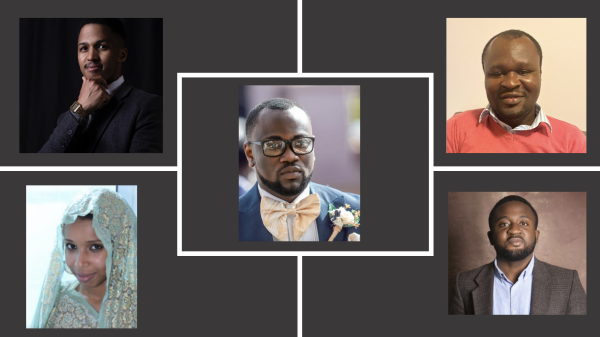
These are photos of the second cohort of PhD students sponsored by Cambridge-Africa when they started in the academic year 2016/2017.
Starting from top left: Bongumenzi, Richmond, Maimuna, Damilola and Sabastine (centre)
Find out what they are up to below:
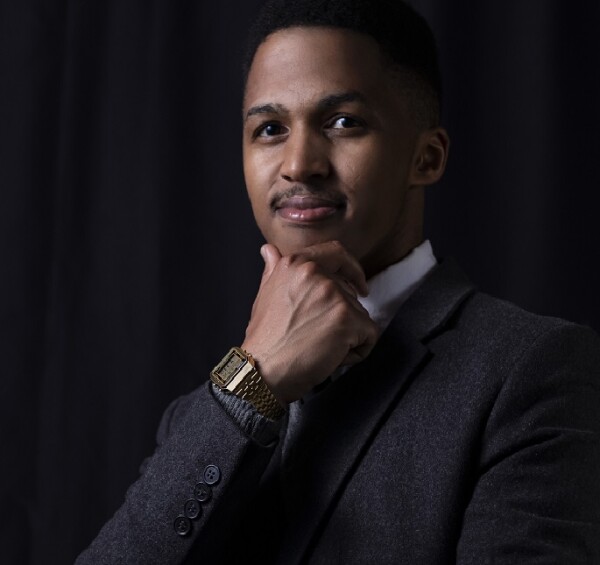
Dr Bongumenzi Nxumalo
| Full name | Bongumenzi Nxumalo |
| PhD project | The role of hydrological changes in the demise of Iron Age state societies in southern Africa: an integrative study of Mapungubwe, South Africa |
| PhD Supervisor (Department) | Prof. Charles French, Department of Archaeology |
| Year of completion | 2020 |
| Bongumenzi.nxumalo@up.ac.za |
WHERE ARE YOU AT THE MOMENT? |
|
I am a lecturer at the University of Pretoria and currently involved in geophysical & geoarchaeological projects in southern Africa.
|
TELL US ABOUT YOUR TIME AT THE UNIVERSITY OF CAMBRIDGE |
|
In my Cambridge Africa blog, I made reference to a number of memories that stood out during my Cambridge journey, the matriculation remains the one memorable moment. During the matriculation, I met the Master of the College Lord Rowan William’s and we began having discussions about the history of Magdalene College, my research and his role in the fight against apartheid and southern African politics. What also stood out, was the inquisitorial nature of Cambridge scholars and their genuine passion to learning about a variety of subjects, regardless of their respective disciplines. The same day, I also met one of my best-friend (Cantab): Mr Bongani Dladla, who is now Director Advisory Group at Royal HaskoningDHV, South Africa. In 2018/19, my research was nominated for a BYE fellowship at Magdalene College, Cambridge University. With this award, I was able to receive advices from the distinguished senior fellows in Magdalene College, dining with Sir John Gurdon (Nobel Laureate in Physiology) and an invitation to the Queen's Garden Party in Buckingham Palace. Lastly, the impressive architecture, narrow cobbled streets and the clinking sounds of bicycles still runs through my mind now that I am back in South Africa.
|
TELL US ABOUT YOUR EXPERIENCE SINCE LEAVING THE UNIVERSITY OF CAMBRIDGE |
|
The Cambridge Africa scholarship and PhD degree has definitely opened up more occupational opportunities. I am currently a lecturer at the University of Pretoria. I teach southern African archaeology and applied archaeology.
|
ALUMNI WISDOM (what can you tell current Cambridge-Africa PhD scholars) |
|
Success works as a cycle - growth and friction, balancing and unbalancing – keep a straight head when things don’t go your way, beautiful things meet friction. Trust in the process, believe and believe!! |
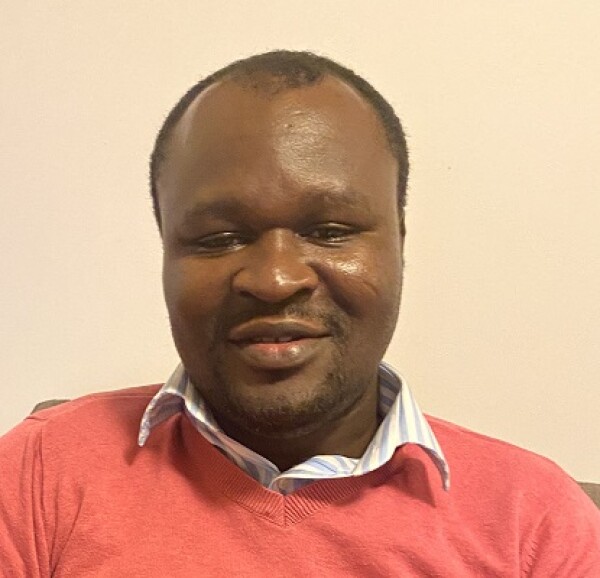
Dr Richmond Juvenile Ehwi
| Full name | Richmond Juvenile Ehwi |
| PhD project | The Proliferation of Gated Communities in Ghana: A New Institutionalism Perspective |
| PhD Supervisor (Department) | Professor Peter Tyler and Professor Nicky Morrison, Land economy |
| Year of completion | 2019 |
| Rje52@cam.ac.uk |
WHERE ARE YOU AT THE MOMENT? |
|
I am currently a postdoctoral researcher at the Cambridge Centre for Housing and Planning Research which is based in the Department of Land Economy at the University of Cambridge.
|
TELL US ABOUT YOUR TIME AT THE UNIVERSITY OF CAMBRIDGE |
|
I got to know about the University of Cambridge because some of the lecturers who taught me during my undergraduate degree had studied in the Department of Land Economy in Cambridge, and sometimes reminisced on their Cambridge experience during lectures. I was determined to also come to Cambridge and witness things for myself and that’s why I ended up here. I guess at the time, the ‘Cambridge’ experience mattered more to me than even the qualification I was going to obtain. I guess they were right after all. My student days in Cambridge were memorable. I was privileged to have served as the Secretary, Vice President and Seminar Convenor to the Cambridge University Ghanaian Society. I was also a member of the Wikipedia Society at Cambridge University. In terms of honours, twice in a row (2018 and 2019), my presentation was adjudged the best in the Department of Land Economy Early Career Researchers’ Conference. |
TELL US ABOUT YOUR EXPERIENCE SINCE LEAVING THE UNIVERSITY OF CAMBRIDGE |
|
I am currently a postdoctoral researcher at the Cambridge Centre for Housing and Planning Research which is based in the Department of Land Economy at the University of Cambridge. I interviewed for this job in July 2019 whiles I was still writing up my thesis and during the interview, I was asked how soon I expected to hand in my thesis. Although a date was set, I thought it would require a miracle to finish on schedule but five weeks after starting work, I handed in my thesis. I couldn’t have achieved this feat without my supervisors who read chapters of my thesis and offered helpful feedback in a short space of time. What I have learnt from this experience is to never underestimate what you can achieve once you put your mind and heart to something. |
ALUMNI WISDOM (what can you tell current Cambridge-Africa PhD scholars) |
|
Three months after I started the PhD, my wife delivered our baby girl and it was a frightening and quite an uncertain period in my life. I had no clue how I was going to complete my first year report while taking care of a new baby. There was however immense support from my church, fellow Ghanaian students, my PhD supervisor (Professor Peter Tyler) and later my mother-in-law. Although the first year was extremely difficult and sometimes left me with doubts over my competence to pursue a PhD, I trusted in the providence of God and constantly reminded myself that I have always stood out in every academic pursuit I have embarked on, and the PhD wasn’t going to be different. I soon realised that being a father made me better appreciate how valuable my time was. So my advice to African scholars starting their PhDs are as follows: Always believe in yourself even when everyone is in doubt; forge a rich social network with people and groups and leverage on your social capital when needed; develop a consistent work pattern and work ethic and keep to it; be extremely selective of your social engagements and read as much as you can. |
Publications |
|
‘Built environment of Britain in 2040: Scenarios and strategies’ ‘Exploring the financial implications of Advance Rent payment and induced furnishing of rental housing in Ghanaian cities: The case of Dansoman, Ghana ‘ “Walls within walls: examining the variegated purposes for walling in Ghanaian gated communities' |
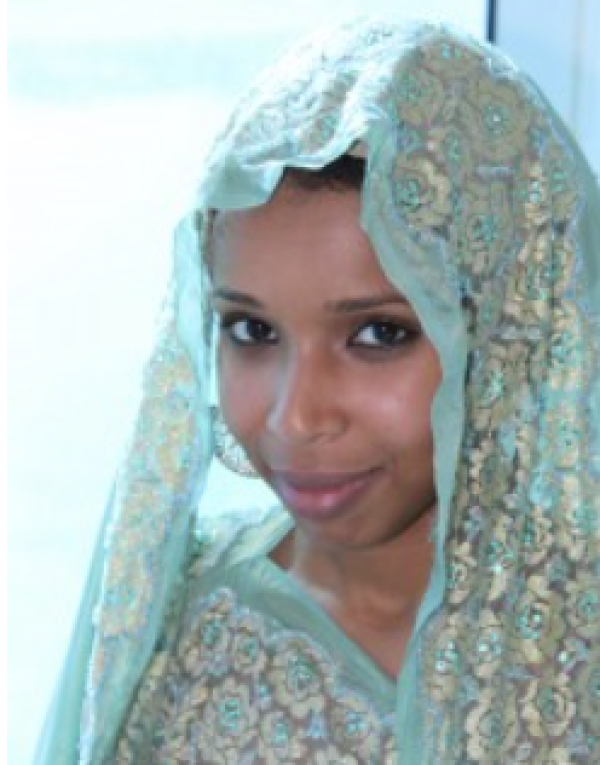
Dr Maimuna Sheikh Abdulle Mohamud
| Full name | Maimuna Mohamud |
| PhD project | Peace Negotiations and Remaking Political Community in Somalia |
| PhD Supervisor (Department) | Dr Devon Curtis, Politics and International Studies |
| Year of completion | 2020 |
| mmohamud0@gmail.com |
WHERE ARE YOU AT THE MOMENT? |
| Currently, I serve as a consultant on several international development projects in Somalia. |
TELL US ABOUT YOUR TIME AT THE UNIVERSITY OF CAMBRIDGE |
| I found Cambridge to be an exciting place to build upon my previous research skills and engage with cutting edge scholarship on the Horn of Africa. In particular, working with Drs Devon Curtis and Christopher Clapham has been truly enriching and extraordinary. With their support, I spent most of time in the field traveling across the Horn to access rare archives and interview key African players for my research. I felt deeply embedded in my research and this was most rewarding to me. I set my eyes on Cambridge wanting to do exceptional and impactful research that can benefit my homeland. Several productive years later, I feel satisfied with my time at the University. |
TELL US ABOUT YOUR EXPERIENCE SINCE LEAVING THE UNIVERSITY OF CAMBRIDGE |
| Currently, I serve as a consultant on several international development projects in Somalia. I am applying for post-doctoral programmes in the UK, US and Canada. I intend to publish my PhD thesis as a book or several articles |
ALUMNI WISDOM (what can you tell current Cambridge-Africa PhD scholars) |
|
A PhD is not a sprint, it is a marathon. Limit distractions and focus on doing research that you love. Start writing in the first year and write every day. Some of those early drafts won’t make the final cut, but it is important to work on your craft every single day. |
Dr Damilola Adewumi Adebayo
| Full name | Damilola Adebayo |
| PhD project | A Socioeconomic History of Electrification in Southern Nigeria, 1898-1972 |
| PhD Supervisor (Department) | Professor Gareth Austin |
| Year of completion | 2020 |
| adebayod@yorku.ca |
WHERE ARE YOU AT THE MOMENT? |
| I am currently an Assistant Professor at the Department of History at York University in Toronto, Canada. I do research on nineteenth and twentieth century Anglophone West Africa, particularly Nigeria. I am leading several projects at the moment. |
TELL US ABOUT YOUR TIME AT THE UNIVERSITY OF CAMBRIDGE |
|
I spent my childhood in Ile Ife, a university town in the hinterland of southwestern Nigeria, regarded as the sacred homeland of the Yoruba people. Apart from the occasional festivals and students' activities, Ile Ife was a sleepy town for the most part of the year. Although I did not appreciate it at the time, in later years, having lived in more densely populated and noisy areas, I began to appreciate and seek out tranquil places. After secondary school, I moved to the city of Ibadan for my undergraduate degree in History. I got a scholarship to go to Geneva, Switzerland for my Masters. I applied to Cambridge for a PhD in History and got a conditional offer. I had to wait for a “very long” period of 4 months before that fateful day when I got the email confirming that I had been awarded a Cambridge-Africa Scholarship. The rest, as they say, is history. Many aspects of my Cambridge experience were memorable. I worked on a research topic that I truly love, joined a few societies, and met people from all walks of life. One moment stands out. When I first arrived in Cambridge, I thought that I would focus exclusively on my research and get my dissertation finished as quickly as possible. The “mistake” I made was to attend the Freshers’ Fair where more than 600 students’ societies promoted their initiatives. I joined some societies involved in projects that aligned with my interests in Nigerian and African development. In fact, the highlight of my first year was the African Society of Cambridge University’s Africa Together conference, which I organized together with an amazing team. Some of my ASCU teammates have now become close friends. I am not sure that I would have had a good time in Cambridge if I had not found this community of like minds in my first year.
|
TELL US ABOUT YOUR EXPERIENCE SINCE LEAVING THE UNIVERSITY OF CAMBRIDGE |
|
I have always wanted to be a professor that is actively engaged in research that addresses African priorities. For instance, my PhD research examined multiple ways in which electricity has been a cause and effect of socioeconomic change in Nigeria. I am grateful that I am now on the path to achieving my dream. I got an academic position just before I submitted my PhD dissertation and got my current job not long after.
|
ALUMNI WISDOM (what can you tell current Cambridge-Africa PhD scholars) |
|
It is often said that the PhD is a lonely journey. This is certainly not true in my case. I will strongly encourage incoming and current scholars to build their own community of care. I will also urge current scholars to take responsibility for their own learning. There are amazing opportunities to develop new skills and to participate in the academic and social life in Cambridge.
|
Publications |
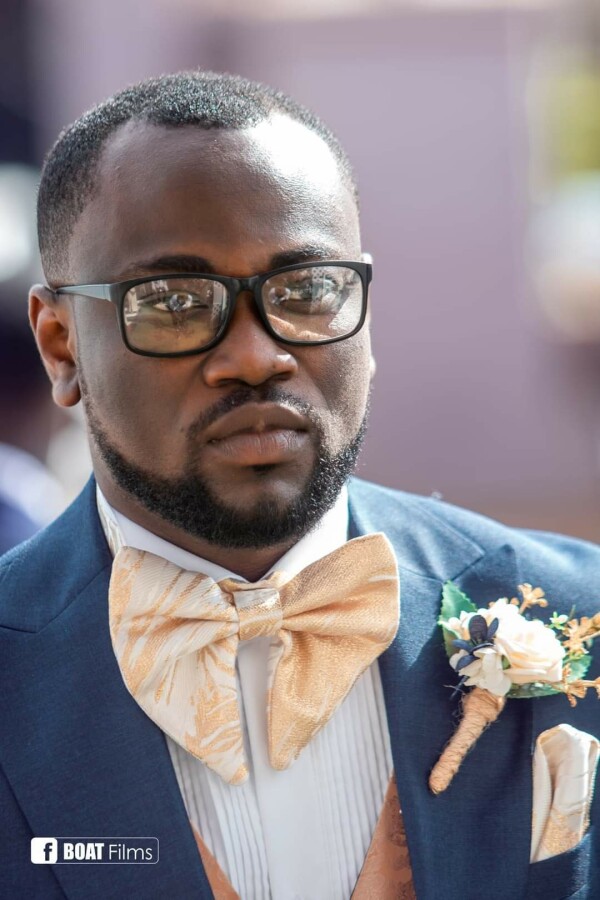
Dr Sabastine Arthur
| Full name |
Sabastine Eugene Arthur |
| PhD Supervisor (Department) |
Professor Ian Goodfellow, Department of Pathology |
| Year of completion | 2020 |
WHERE ARE YOU AT THE MOMENT? |
|
|
Currently, I am in the United States of America as a postdoctoral trainee at the Department of Microbiology and Immunology, School of Medicine, University of North Carolina at Chapel Hill. |
|
TELL US ABOUT YOUR TIME AT THE UNIVERSITY OF CAMBRIDGE |
|
|
|
TELL US ABOUT YOUR EXPERIENCE SINCE LEAVING THE UNIVERSITY OF CAMBRIDGE |
|
|
|
ALUMNI WISDOM (what can you tell current Cambridge-Africa PhD scholars) |
|
| Being a PhD student in Cambridge makes you unique and comes with a lot of advantages. Use the opportunity to network, get involved with societies and associations. Learn from your supervisor, mentors, and colleagues. No one person knows everything. Remember, immediately you gain admission to the University of Cambridge, you are set to become a leader who will effect a change in the world. Make every minute count! | |
Publications |
|

